
With an anything-goes approach to sampling, and a tongue-in-cheek sense of humour that’s often branched into the bizarre, ambient house outfit The Orb have cultivated one of the largest, and most varied, catalogues in British electronic music. 35 years on from their debut single, and with the help of founder Dr Alex Peterson, Ben Cardew maps their unlikely route to mainstream success, and learns why no sounds are out of bounds
Humour in music is a difficult thing to pull off, longevity even more so. But for the English ambient house act The Orb, the secret to the latter has often been in the former. With an anything-goes attitude to sampling that has frequently branched into the bizarre, the group led by Dr Alex Paterson has amassed a ridiculously prodigious catalogue over the past three decades. Amidst all the weirded-out soundscapes, however, you’ll find numerous pop-adjacent hits that have wormed their way into the charts more than once. For thousands of people in the UK, The Orb were a gateway drug — an unfiltered first taste of electronic music at its most adventurous, bright and entertaining.
To this day, The Orb have a faithful, passionate audience who buy their new records and attend their live gigs; in April 2023, they released their eighteenth studio album, ‘Prism’. They’re hardly obscure, yet they feel somehow underrated. Here’s an act that could feasibly stake a claim to having one of the most influential UK electronic discographies of all time, but despite their evident successes, this pioneering outfit don’t really seem to get their due.
In September, a career-spanning compilation, ‘Orboretum: The Orb Collection’, went some way to redressing this. Coinciding with the 35th anniversary of their debut single proper, October 1989’s ‘A Huge Ever Growing Pulsating Brain That Rules from the Centre of the Ultraworld’, the anthology features a whopping 33 tracks from their catalogue. Among them are the Saturday Night Live-sampling ‘Pommes Fritz (Meat N’ Veg)’, the operatic cow bells of ‘Alpine Morning’, and the hard Schaffel thump of ‘Lunik (Komplott E.P. Version)’, which eventually morphs into ‘Singing In The Rain’. Pink Floyd’s David Gilmour makes an appearance in ‘Metallic Spheres In Colour — Round Side (2024 Edit)’, and there’s even a surprisingly pumping Orbital Dance Mix of ‘A Huge Ever Growing Pulsating Brain…’, which has nothing to go with the Hartnoll brothers and everything to do with a driving beat and oddly bubbling sound effects.
Even Paterson — The Orb’s only consistent member since day one — admits to getting lost in their gigantic body of work, which has featured a wide range of collaborators, including Thomas Fehlmann, Roger Eno, Steve Hillage, Lee “Scratch” Perry, Jah Wobble and, most recently, Michael Rendall. So why not start at the beginning?
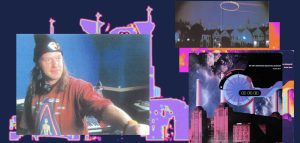
“I learned from my early DJ years that you can create another sound if you know how to play two records together. So why not use three?”
In the late ‘80s, Paterson lived in Battersea, London with his childhood friend, the Killing Joke bassist Martin “Youth” Glover, just downstairs from Andrew Weatherall. Jimmy Cauty — who had been in the band Brilliant with Glover and would soon go on to co-found another influential ambient house act, The KLF — visited often and before long the three were working on music and DJing together. As The Orb, Cauty and Paterson landed a chillout room residency at Heaven’s fabled Land of Oz parties, where they played everything from 808 State’s ‘Pacific State’ to progressive rock, dub and New Age. This, in turn, influenced the music they’d make together.
“I’d have six record decks going at the same time, plus cassettes and a DAT machine,” Paterson remembers when we speak to him in early November. “But I wouldn’t be playing one piece of music. I’d be playing all these sound effects that went with the piece of music. So the piece of music became basically another piece of music.”
They began to work the influence of these live jams into tracks of their own, such as the acid house-flavoured ‘Tripping On Sunshine’ and the ‘Kiss’ EP. However, the real lightbulb moment came when they decided to strip most of the drums out of a particular tune they were working on. The move would form the basis for what would become ambient house — a very British, quietly ravey take on Brian Eno’s vision of ambient music –— but as Paterson explains, it came almost entirely out of a fuzzy-headed whim. “We’d been at a rave all night, me and Jimmy [Cauty], laid on the beach,” he remembers. “He had a massive hangover headache. So I said, ‘Well, can we just take the drums out?’ ‘Go on then.’… So [later on the studio] we got rid of the drums and, as they say, the rest is history.”
The result was ‘A Huge Ever Growing Pulsating Brain…’, which they released on Paterson and Youth’s WAU! Mr. Modo Recordings. A stunning 19-minute swirl based around a prominent but decontextualised sample of Minnie Riperton’s ‘Lovin’ You’ — which was later replaced with a soundalike singer — and a chord progression borrowed from Grace Jones’ ‘Slave To The Rhythm’, the track is bold, epic and emotional, a melancholy musical wave hitting the summer shore. It paved the way for The Orb’s classic first two albums: 1991’s ‘The Orb’s Adventures Beyond the Ultraworld’ and 1992’s ‘U.F.Orb’.
The former is a genius sprawl of ambient house, dub basslines, outré samples and strung-out melodies: ‘Spanish Castles in Space’ is like a jazz track slowly drifting away on solar winds, and includes a sampled voice speaking in Russian about fish; ‘Earth (Gaia)’ uses a perfectly ridiculous clip from the 1980 Flash Gordon film as a springboard into breakbeat house; ‘Outlands’ locates the exquisite mid-point between White Noise’s spook-psych classic ‘Love Without Sound’ and The Upsetters’ heavy dub. The album’s brilliant, otherworldly singles, ‘Little Fluffy Clouds’ and ‘Perpetual Dawn’, meanwhile, gesture toward Paterson’s ear for a pop flourish, both of them skimming the bottom end of the British charts on their initial release and going top 20 when re-released a few years later.
‘Little Fluffy Clouds’ — arguably The Orb’s best-known track — exemplifies their bold sampling style. Centred around the juxtaposition of two unlikely snippets — Rickie Lee Jones talking about her childhood, and sections of Steve Reich and Pat Metheny’s ‘Electric Counterpoint’ — the song slowly weaves a variety of other sounds into the mix, including an Ennio Morricone harmonica, a rooster’s crow and a Radio 4 broadcast about the English summer. “I learned from my early DJ years that you can create another sound if you know how to play two records together,” Paterson says. “So why not use three?”
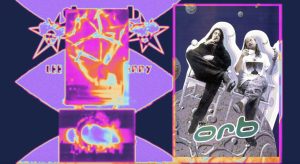
“That’s something that’s unique to The Orb: that humour. Orbital or any of those other bands, like Underworld, don’t have that. That’s my humour again. I call them ‘Underwear’ or ‘Underpants’… But I do like Underworld.”
Crucially, The Orb did this all with a grin, separating the music from its potentially imposing origins, particularly for young audiences. “It’s about putting a smile on people’s faces when they listen to music,” Paterson says. “That’s something that’s unique to The Orb: that humour. Orbital or any of those other bands, like Underworld, don’t have that. That’s my humour again. I call them ‘Underwear’ or ‘Underpants’… But I do like Underworld.”
It made this weird, out-there music accessible somehow, and these techniques continued to evolve in ‘U.F.Orb’, for which Paterson collaborated with Kris Weston, AKA Thrash. The album spawned tracks such as the magnificent interstellar expansion of ‘O.O.B.E’, the gurgling and Detroit-ish ‘Close Encounters’, and their heaviest dub number, ‘Towers of Dub’. That one opens with a sampled prank call from comedian Victor Lewis Smith — “Is that Haile Selassie? No, it wasn’t him, it was a cab.” — before lurching into a 15-minute odyssey that combines a horizontal patchwork of found sound, from echoing dog barks to a bluesy harmonica, with a truly vicious bassline.
The album also features their farthest-out chart hit, the amiable 40-minute monster, ‘Blue Room’, a shortened edit of which reached No. 8 in the UK charts. This anomaly led to the uniquely unusual site of Paterson and Thrash playing chess live on primetime British TV for Top Of The Pops. More bizarrely still, ’U.F.Orb’ ending up making it to No.1 in the British album charts in July 1992.
“The first two albums were just totally innocent,” says Paterson. “That was the beauty of the first album, especially: I wasn’t tied down to anybody telling me what to do… I always think that the first album that anybody does should be their best album. Because that encompasses your whole life before you put that record out.”
The Orb’s modus operandi of free-flowing musical improvisation has more in common with a jam band or jazz artist than the traditional song-based approach of rock and pop music. The surprising mainstream success of those first two albums made them a perfect entry point for listeners who were curious about electronic music; their radiant pop melodies and playful soundscapes served as the spoonfuls of sugar that allowed album-loads of abstract weirdness to slip down.
With their brazen sampling, The Orb redefined what music was for many people. They were one of the first mainstream electronic acts to demonstrate that you could take two separate pieces of music, or a collection of seemingly random sounds, and put them together to create something legitimately new. They proved that this was, in itself, a creative act on a par with pulling out a guitar and strumming a few chords. “I’ve always thought that plagiarism is creative,” Paterson told Sound on Sound in 2011. “In no way did I consider it to be destructive, especially if you can twist that sample and make it become something else.”
When asked if this is a position he still holds today, Paterson is fervent. “It totally is, if you use [plagiarism] in a way that is great,” he says. “You can be an arse and just take somebody else’s music and then say ‘I’ve done that myself’, or you can take parts of it and create something better or more humorous or more ethereal.”
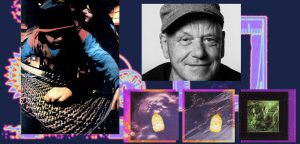
“I had some near death experiences being ill in the last couple of years. So celebrating that I’m still alive is a good reason to make a new record.”
Making music that is genuinely funny is often a fool’s errand, but The Orb have reliably managed it without distracting from the quality of their work. It’s a knack that’s continued into their recent output too: ‘Say Cheese (Siberian Tiger Cookie Mix)’ — a cosmic dub jam from 2020’s ‘Abolition of the Royal Familia’. It kicks off with a quintessentially clipped British voice talking about “one piece of cheese of uncertain dimensions”, while ‘Prism’’s ‘Why Can You Be In Two Places At Once When You’re Not Anywhere At All’ features an exchange in weirdly comic voices about someone called “Gary”.
1993 may well have been the height of The Orb’s commercial success, but the band regularly came up with the goods in the following years, and continued to make periodic visits to the UK charts. Paterson has plenty of lesser-known favourites of his own buried within the band’s catalogue. He loves ‘Ghostdancing’ from the 2001 album ‘Cydonia’, and ‘Baghdad Batteries’ from the 2009 album of the same name. There’s also the group’s entire 2012 album with Lee “Scratch” Perry, ‘The Orbserver in the Star House’, and 2016’s ‘COW / Chill Out, World!’, which saw Paterson building songs around spontaneous iPhone recordings long before Fred again.. did it.
Fan favourites, meanwhile, include the reggae ooze of ‘Slug Dub’ from 1995’s ‘Orbus Terrarum’, and the vast pop riffs and dub house skank of ‘Toxygene’ from 1997’s ‘Orblivion’, which once again saw them appear on Top Of The Pops. Then there’s the feisty and focused ‘Abolition of the Royal Familia’, an album that was made as a protest against the British royal family’s historical endorsement of the East India Company’s role in the opium trade. It’s the presence of albums like that within their catalogue that prove The Orb as much more than just some ambient house act with a sense of humour. Few people listening to the pretty melodies of ‘Little Fluffy Clouds’ or the horizontal sprawl of ‘Spanish Castles in Space’ would have thought of The Orb as a political beast, but Paterson and company rarely, if ever, do what’s expected of them. They’re hard to quantify; they don’t slip into easy categorisation.
The Orb were also crucial in helping to establish electronic music as a live force in the UK. They first played live in May 1991, debuting with a secret gig at London’s T&C 2 (now The Garage), before their official debut at the Brixton Fridge the following day. They quickly became a regular fixture on the gig circuit, playing ever bigger and more prestigious venues as their chart fame grew, with visuals courtesy of Chris Craig. They even released a number of live albums — notably ‘Live 93’, which went to No.23 on the British charts — as if to scoff at the idea that electronic music couldn’t be taken into the live arena. With arms wide open, The Orb reached out to mainstream chart-buying audiences who might feel otherwise averse to stepping into the world of electronic psychedelia and narcotic suggestion.
If The Orb had split in the mid ’90s, rather than soldiering on, we would probably be talking about them in the same rarefied breath as The KLF. But they didn’t. Instead, the group kept on, under the watchful eye of Paterson and an ever-changing raft of collaborators. And he’s still going strong. When we speak to him, he tells us that he’s currently working on the follow-up to ‘Prism’ in spite of recent health issues, including a stroke and a heart attack in 2020. “Being alive really is the main emphasis for this album,” Paterson explains towards the end of our interview. “I had some near death experiences being ill in the last couple of years. So celebrating that I’m still alive is a good reason to make a new record.”
It’s almost easier to ignore The Orb than to try to get a grip on the 35-year history of this most ludicrous of electronic acts. But you can’t talk about the history of electronic music in the UK without talking about The Orb. Hundreds of thousands of people saw Nirvana on Top of the Pops and went on to form grunge bands; thousands more saw The Orb farting around with a chess board on the same show and got into electronic music. That’s how important they are.
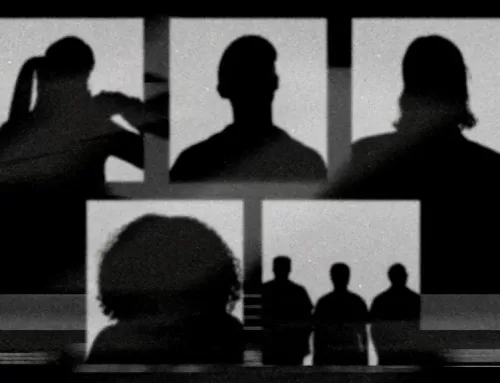

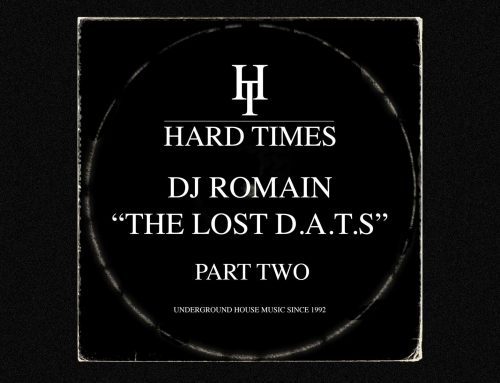

![Carl Cox says his Ibiza residency at [UNVRS] will be a “whole new world” (DJ Mag)](https://www.myhouseradio.fm/wp-content/uploads/2025/04/carl-cox-1.jpg-500x383.webp)
Leave A Comment
You must be logged in to post a comment.